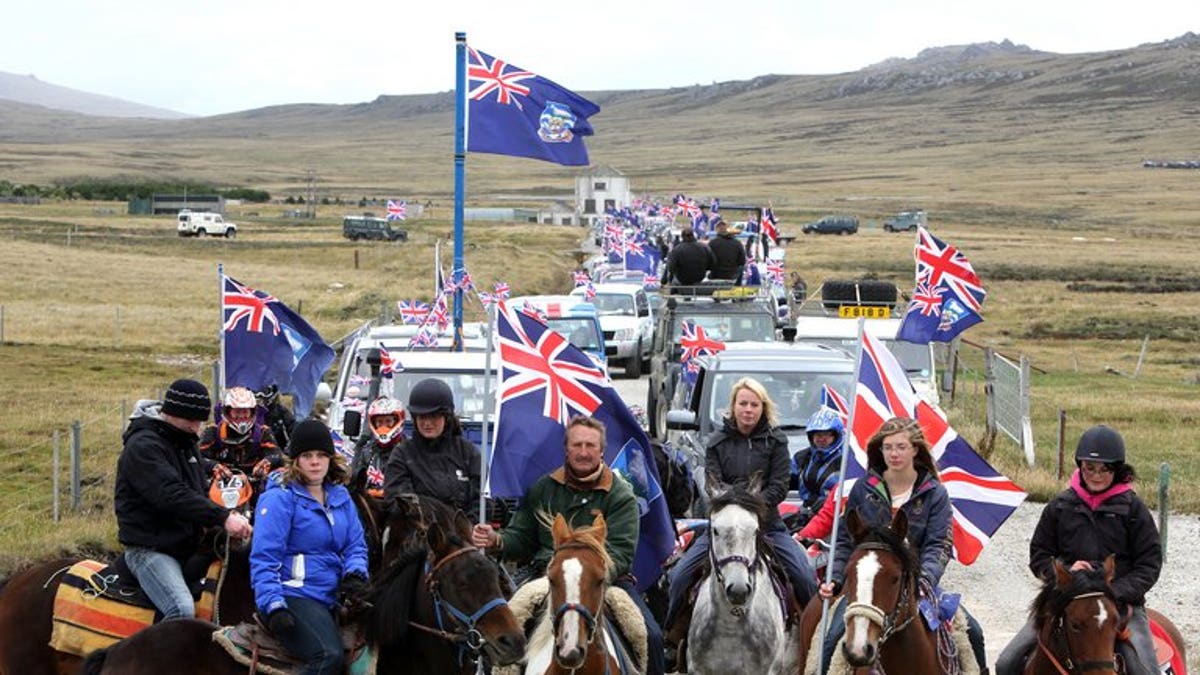
Islanders take part in the "Proud to be British" parade along Ross Road in Port Stanley, Falkland (Malvinas for Argentina) Islands, on March 10, 2013. Sandy Woodward, who commanded the British navy task force that retook the Falkland Islands in the 1982 war with Argentina, has died aged 81, the defence ministry confirmed. (AFP/File)
LONDON, England (AFP) – Sandy Woodward, who commanded the British navy task force that retook the Falkland Islands in the 1982 war with Argentina, has died aged 81, the defence ministry confirmed on Monday.
The admiral died after a long illness, his daughter told the BBC.
Prime Minister David Cameron said he was "a truly courageous and decisive leader who helped ensure Falkland Islanders can still live in peace and freedom".
Britain has held the Falklands since 1833 but Buenos Aires claims the barren South Atlantic islands are occupied Argentine territory.
Argentina's then-ruling military junta invaded the windswept archipelago on April 2, 1982 but surrendered on June 14 after the British task force reclaimed it.
Troops landed on the islands and marched to the capital Stanley.
The conflict cost the lives of 649 Argentine and 255 British service personnel.
The Falkland Islands government said: "We are saddened to hear of the passing of Adml Sir Sandy Woodward. A true friend of the Falklands. We remain forever grateful."
Admiral Sir George Zambellas, head of the British navy, said Woodward would always be remembered for his "powerful and clear command" of the task force.
He had been "undaunted by the challenge of fighting a capable enemy over 8,000 miles from the UK, in the most demanding and extreme of weather conditions," Zambellas said.
Woodward joined the navy aged 13. He wrote a memoir of the Falklands campaign entitled "One Hundred Days".
On the 29th anniversary of the islands' recapture, he said military cuts meant Britain would struggle to defend the Falklands from another Argentine attack.
The admiral cited the lack of an aircraft carrier and weakening US support for British sovereignty.
In the face of increasing Argentine calls to negotiate the Falklands' sovereignty, the islanders -- who number just 2,563 -- voted 99.8 percent in favour of remaining a British overseas territory in a referendum in March.
The London Evening Standard newspaper's defence editor Robert Fox, who landed on the Falklands with the assault troops in 1982, said Woodward could be "quite peppery" but got through by "sheer grit".
"He wasn't an intellectual -- he was a very bright, very sharp, very capable commander," he told BBC television.
"The kind of risks he took and was ordered to take wouldn't be taken today.
"They were under-protected, they were under-armed in many ways."
Britain's victory "was remarkable and it was remarkably quick, because he knew how to take risks," Fox said.
